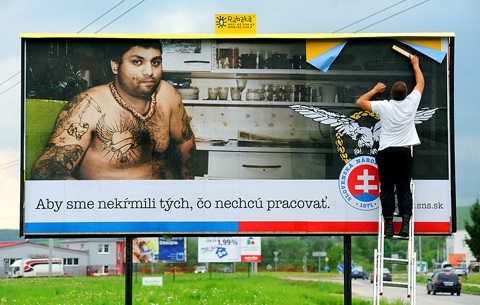The far-right Slovak National Party (SNS) has outraged Roma with election posters suggesting they abuse the welfare state, straining ethnic relations in the run-up to a general election.
Posters for the SNS show a dark-skinned man with tattoos and a golden necklace, accompanied by the slogan “Do not feed those who do not want to work.”
The SNS, a government coalition partner of Slovakian Prime Minister Robert Fico, has been running low in opinion polls before the June 12 vote.

PHOTO: REUTERS
SNS leader Jan Slota’s campaign was “disgusting,” Frantisek Tanko of the Union of Slovak Roma told reporters. “We hear nothing from Mr Slota but ‘Roma are dirty and steal.’”
Up to 10 percent of Slovakia’s 5.4 million people are Roma. Most live on the margins of society in squalid settlements with limited access to education, electricity and running water. In many communities, unemployment runs at well over 50 percent.
The euro zone member was accused by UN High Commissioner for Human Rights Navi Pillay in March of eroding the treatment of Roma.
The SNS has frequently criticized both the Roma and the country’s half-million-strong Hungarian minority.
Slovak media firm euroAWK, a unit of Germany’s media group AWK whose ad space was used for the campaign, said it would cover up all 29 of the controversial posters in the region of the capital, Bratislava. Other firms continued to place the posters in other regions.
The SNS said the billboard referred to all Slovaks exploiting the welfare system.
“Those who scream the man on the billboard is Roma, or a Gypsy, are racists. How did you come to the conclusion he’s a Gypsy?” party vice-chairwoman Anna Belousovova said.
Fico, whose leftist SMER party is seen as the election front-runner, said last month that boarding schools were the only way to break a cycle of exclusion in which most Roma grow up without any hope of joining mainstream society.

In the sweltering streets of Jakarta, buskers carry towering, hollow puppets and pass around a bucket for donations. Now, they fear becoming outlaws. City authorities said they would crack down on use of the sacred ondel-ondel puppets, which can stand as tall as a truck, and they are drafting legislation to remove what they view as a street nuisance. Performances featuring the puppets — originally used by Jakarta’s Betawi people to ward off evil spirits — would be allowed only at set events. The ban could leave many ondel-ondel buskers in Jakarta jobless. “I am confused and anxious. I fear getting raided or even

Kemal Ozdemir looked up at the bare peaks of Mount Cilo in Turkey’s Kurdish majority southeast. “There were glaciers 10 years ago,” he recalled under a cloudless sky. A mountain guide for 15 years, Ozdemir then turned toward the torrent carrying dozens of blocks of ice below a slope covered with grass and rocks — a sign of glacier loss being exacerbated by global warming. “You can see that there are quite a few pieces of glacier in the water right now ... the reason why the waterfalls flow lushly actually shows us how fast the ice is melting,” he said.

RISING RACISM: A Japanese group called on China to assure safety in the country, while the Chinese embassy in Tokyo urged action against a ‘surge in xenophobia’ A Japanese woman living in China was attacked and injured by a man in a subway station in Suzhou, China, Japanese media said, hours after two Chinese men were seriously injured in violence in Tokyo. The attacks on Thursday raised concern about xenophobic sentiment in China and Japan that have been blamed for assaults in both countries. It was the third attack involving Japanese living in China since last year. In the two previous cases in China, Chinese authorities have insisted they were isolated incidents. Japanese broadcaster NHK did not identify the woman injured in Suzhou by name, but, citing the Japanese

RESTRUCTURE: Myanmar’s military has ended emergency rule and announced plans for elections in December, but critics said the move aims to entrench junta control Myanmar’s military government announced on Thursday that it was ending the state of emergency declared after it seized power in 2021 and would restructure administrative bodies to prepare for the new election at the end of the year. However, the polls planned for an unspecified date in December face serious obstacles, including a civil war raging over most of the country and pledges by opponents of the military rule to derail the election because they believe it can be neither free nor fair. Under the restructuring, Myanmar’s junta chief Min Aung Hlaing is giving up two posts, but would stay at the